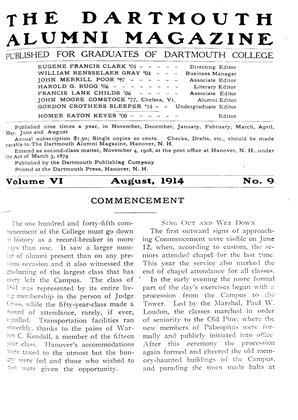As the result of negotiations which have been in progress for several months Dartmouth College has withdrawn from the New England College Entrance Certificate Board of which it has been a member since the establishment of the Board twelve years ago.
The reason for this action lies primarily in the unwillingness of the Certificate Board to grant Dartmouth's request for permission to deal with New Hampshire secondary schools directly, instead of through the medium of the Board. Dartmouth contends that such direct action is necessary, in view of the peculiarly intimate relations existing between the State and her chief college. According to the terms of the Dartmouth Charter, for nearly a century and a half the .Governor of the State has, by virtue of office, been a trustee of the College. Six others of the twelve trustees must likewise be citizens of New Hampshire. The claim of the State upon the College for a close and sympathetic cooperation with its public school system is therefore, from the Dartmouth view point, a special one that cannot be fully satisfied through the intermediary of a formal board.
Representations to this effect were made last spring to the colleges whose representatives constitute the Certificate Board. Their refusal to recognize the situation has left Dartmouth no recourse except to withdraw from participation in the work of the Board.
The New England College Entrance Certificate Board was established twelve years ago for the purpose of standardizing the administration of the certificate system of College entrance. Today its membership represents sixteen colleges. It has accomplished an invaluable work in bringing the certificate system in New England to a high state of efficiency, with resultant increase in the thoroughness of college preparatory teaching. Its methods, however, have always been mechanical and disciplinary rather than personal and sympathetic in character, and, of late, have aroused considerable opposition among principals and superintendents in the public school systems of New England. The Board itself has been characterized as an "Educational Trust," and its action in many cases as arbitrary, unjust and undemocratic.
Dartmouth, which was one of the founders of the Board, withdraws reluctantly. But, in view of its obligation on the one hand to the schools of New Hampshire, and on the other hand to the schools outside of New England, which furnish more than a third of its student enrollment, the College feels that the time has come for the establishment of new and broader educational policies that shall be worked out in cooperation with the secondary schools, rather than devised exclusively among the higher institutions to be imposed upon the lower. This does not at all imply reduced standards of admission. It should, in the long run, produce advanced standards: altered, perhaps, to meet changed conditions, but rigorously enforced by school and College alike because believed in by both.
This action has .naturally attracted the attention of educators and aroused widespread comment from the press. Almost without exception this comment is favorable and the conviction is expressed that the step will mean not only more flexibility but a maintenance of high standards for entrance. As typical of many editorial comments that of the Boston Transcript is here quoted in part:
"Dartmouth strikes out for herself in the announcement that she will deal for the future with the secondary schools direct, without the mediation of the entrance certificate boards, assigning as her reason certain claims on her advantages by the New Hampshire secondary schools. The College is intimately bound up with the State. It owes much to the State, and should be, in an instructional sense prepared to discharge the debt. New Hampshire has numerous small town high schools which do not in the older entrance examination sense, "prepare" for college; but the youth of them are preeminently college material. The newer plan is to admit these youth to the college and relegate the question of whether they are to remain there to the boy himself. As touching Dartmouth's relations with the college entrance board, this is a bold move, and not possible to any but a college strong both in numbers and in prestige. It furnishes indirect substantiation of the claim that Dartmouth desires to keep enrollment down to 1300, while eliminating as one may say, the middleman and dealing direct with the consumers of education. At the same time it is a move of a sane, logical and conservative fashion toward the democratization of education."
As for the future policy of admission, Dartmouth has announced to the principals of New England schools that the College would deal directly with them, as heretofore with schools outside of New England. For the present the approved list for New England will stay the same as that accepted by the College while a member of the College Entrance Board, but hereafter additions or subtractions to the list will be made by the Faculty Committee on Admission. In considering new schools the College will make its own examination and schools will be removed from the list only when the product has proved unsatisfactory at Dartmouth.
 View Full Issue
View Full Issue
More From This Issue
-
 Article
ArticleCOMMENCEMENT
August 1914 -
 Class Notes
Class NotesCLASS OF 1899
August 1914 By George G. Clark, G.G. CLARK -
 Article
ArticleTHAYER SCHOOL OF CIVIL ENGINEERING
August 1914 By Robert Fletcher -
 Article
ArticleTHE COLLEGE YEAR
August 1914 -
 Article
ArticleDARTMOUTH MEDICAL SCHOOL, ITS PRESENT STATUS AND ITS POSSIBILITIES
August 1914 By Frederic Pomeroy Lord '98 -
 Article
ArticleTHE AMOS TUCK SCHOOL OF ADMINISTRATION AND FINANCE
August 1914 By Harlow S. Person








